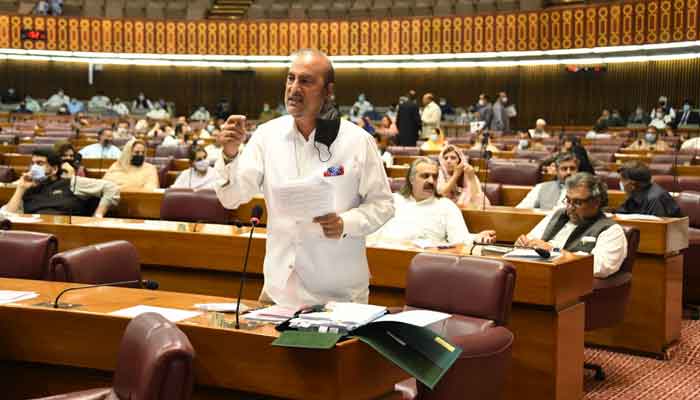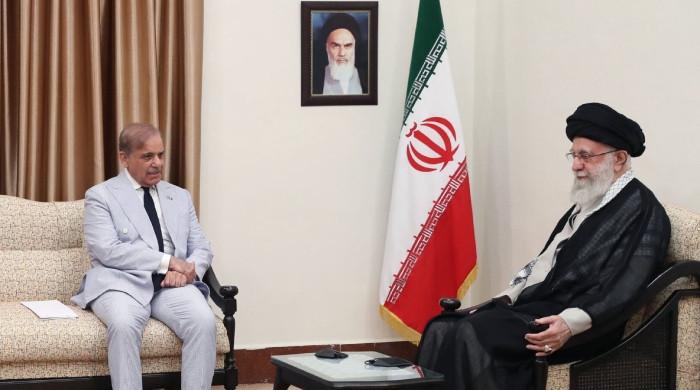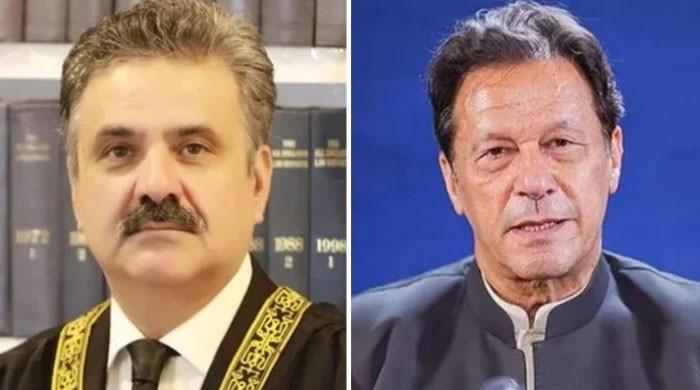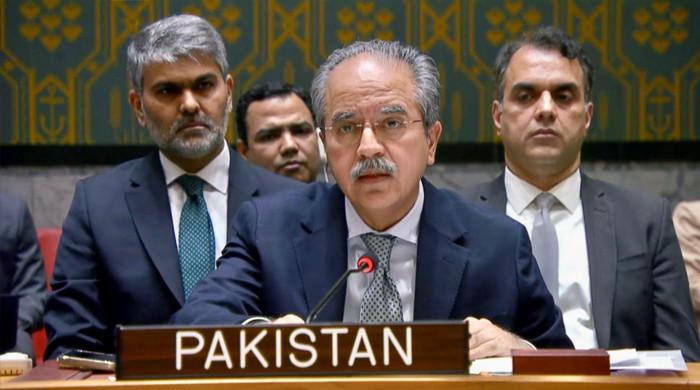In record day for Pakistan's parliament, which 21 govt bills were passed?
Bills included the Elections (Amendment) Bill, 2020 and the International Court of Justice (Review and Re-consideration) Bill
June 10, 2021

ISLAMABAD: The National Assembly on Thursday passed a record 21 government bills including laws related to the conduct of elections and the International Court of Justice (Review and Re-consideration) Bill, 2020 to bring into effect the judgment of the International Court of Justice in the case of Indian spy Kulbhushan Jadhav.
Advisor to Prime Minister on Parliamentary Affairs Babar Awan tabled the Elections (Amendment) Bill, 2020 for consideration after suspension of the rules.
The House passed the bill with majority vote after voice voting, state media reported.
Opposition files no-confidence motion against NA Deputy Speaker Qasim Suri
The Election (Amendment) Bill, 2020 was introduced in the National Assembly on October 16, 2020. It was referred to the Standing Committee on Parliamentary Affairs the same day.
The major proposed amendments to the bill include:
- more financial autonomy to Election Commission of Pakistan (ECP) (Section11(2));
- delimitation on the basis of equal number of voters instead of population (Sections 17&20);
- appeal to Supreme Court by any aggrieved person on delimitation lists (Section 21(5) new);
- variation in delimitation not exceeding 5% (instead of 10%) (Section 20);
- sections relating to electoral rolls by ECP to be omitted (24, 26, 28-34, 36-42, 44);
- electoral rolls same as registration ID data of NADRA (Section 25);
- appointment of polling staff from amongst the officers/staff from outside of a constituency (Section 53);
- provision to challenge appointment of polling officers/staff within 15 days of appointment (Section 15);
- increase in nomination fee (Section 61);
- seat to be vacated if returned candidate does not take oath within 60 days from first sitting (Section 72 A new);
- appointment of five election agents for a polling station instead of one (Section 76(1));
- overseas Pakistanis to be extended voting rights (Section 94);
- use of electronic voting machines in elections to make it transparent (Section 103);
- polling for Senate elections under open ballot (subject to amendment in Article 226 of the Constitution);
- enlistment of political parties on the basis of 10,000 members (instead of 2000) including 20% women (Section 202); annual convention by political parties (Section 213a new);
- and introduction of timelines for various election procedures.
Elections (Second Amendment) Bill
Likewise, the House passed the Elections (Second Amendment) Bill which pertains to fair, free and transparent election through utilisation of technology and modern gadgets.
The bill is also aimed at granting voting rights to the Overseas Pakistanis which may only be possible by vesting exclusive authority in ECP with technical assistance of NADRA and other agencies.
Amendments were sought in section 94 and 103 of the Election Act, 2017 to achieve the aforesaid objectives.
This bill was also piloted by Awan in the House.
Review bill in Jadhav case
Meanwhile, the House also passed a bill to provide for the right of review and reconsideration to bring into effect the judgment of the International Court of Justice in the Kulbhushan Jadhav case — The International Court of Justice (Review and Re-consideration) Bill, 2020.
The bill was moved by Minister for Law and Justice Dr Muhammad Farogh Nasim in the House.
The statement of objects and reasons of the bill says that the government of India initiated proceedings against Pakistan in the International Court of Justice (ICJ), concerning alleged violations of the Vienna Convention on Consular Relations of 24 April 1963 ”in the matter of detention and trial of an Indian national, Commander Kulbhushan Sudhir Jadhav”, who had been sentenced to death by the Military Court in Pakistan in April 2017.
Commander Jadhav was a RAW operative, who facilitated numerous acts of terrorism in Pakistan, which resulted in the killing of countless innocent citizens of Pakistan.
The ICJ gave its judgment on 17th July, 2019 wherein it observed that “Pakistan is under an obligation to provide by means of its own choosing effective review and reconsideration of the conviction and sentence of Mr Jadhav, so as to ensure that full weight is given to the effect of the violation of the rights set forth in Article 36 of the Vienna Convention, taking account of paragraphs 139, 145 and 146 of this judgment”.
In order to give full effect to the said judgment, it is necessary that a mechanism for review and reconsideration of Pakistan’s own choice be provided.
This can be done by law only.
Earlier, speaking on the occasion, the law minister said that Pakistan was a responsible state. The passage of the bill would help block Indian nefarious designs, he added.
He said consular access was not given to Jadhav during the PML-N regime while the incumbent government provided consular access to him twice.
He said it was mandatory to bring legislation in order to provide fresh consular access to Jadhav under ICJ decision.
Naseem called for the support of the whole house it as it was tantamount to the support of Pakistan.
Other bills
The other bills passed by the House were the
- Financial Institutions (Secured Transactions) (Amendment) Bill, 2021;
- Port Qasim Authority (Amendment) Bill, 2021;
- Pakistan National Shipping Corporation (Amendment) Bill, 2021;
- Gwadar Port Authority (Amendment) Bill, 2021;
- Regulation of Generation, Transmission and Distribution of Electric Power (Amendment) Bill, 2021;
- Anti-Rape (Investigation and Trial) Bill, 2020;
- Mutual Legal Assistance (Criminal Matters) (Amendment) Bill, 2021;
- Federal Medical Teaching Institutes Bill, 2020;
- National Institute of Health (Re-organization) Bill, 2020;
- Maritime Security Agency (Amendment) Bill, 2021;
- International Court of Justice (Review and Re-consideration) Bill, 2020;
- COVID-19 (Prevention of Hoarding) Bill, 2020;
- SBP Banking Services Corporation (Amendment) Bill, 2020;
- Corporate Restructuring Companies (Amendment) Bill, 2021;
- Companies (Amendment) Bill, 2021;
- Pakistan Academy of Letters (Amendment) Bill, 2021;
- Muslim Family Laws (Amendment) Bill, 2020] (Section 4);
- Muslim Family Laws (Amendment) Bill, 2020] (Section 7); and
- Criminal Law (Amendment) Bill, 2021.
Earlier, Awan introduced three government bills which were referred to the relevant committees for consideration.
These bills were the Pakistan Allied Health Professionals Council Bill, 2021; the Pakistan Nursing Council (Amendment) Bill, 2021 and the Mutual Legal Assistance (Criminal Matters) (Amendment) Bill, 2021.
Minister of State for Parliamentary Affairs Ali Muhammad Khan also presented the Report of 2nd Biannual Monitoring on the Implementation of 7th NFC Award (January-June, 2020).
Later, the House was adjourned to meet again on Friday at 4pm for annual budget presentation.











